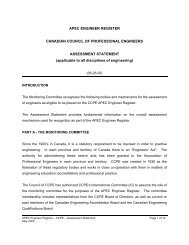Glossary of Terms (pdf) - Washington Accord
Glossary of Terms (pdf) - Washington Accord
Glossary of Terms (pdf) - Washington Accord
Create successful ePaper yourself
Turn your PDF publications into a flip-book with our unique Google optimized e-Paper software.
educational accord.<br />
Exit-level outcome: is a statement <strong>of</strong> the learning outcomes the student must demonstrate at the exit<br />
level to qualify for award <strong>of</strong> a qualification; these actions indicate the student’s capability to<br />
fulfill the educational objectives.<br />
Forefront <strong>of</strong> knowledge in an engineering discipline/speciality: defined by current published research<br />
in the discipline or speciality.<br />
Forefront <strong>of</strong> the pr<strong>of</strong>essional discipline/branch: defined by the most advanced practice in the<br />
specialisations within the discipline.<br />
Formative development: the process that follows the attainment <strong>of</strong> an accredited education programme<br />
that consists <strong>of</strong> training, experience and expansion <strong>of</strong> knowledge.<br />
General range statements: Range statements applicable to generic competencies See Range<br />
Indicator/Statement<br />
Generic competence: is a competency that is required within a category <strong>of</strong> registration irrespective <strong>of</strong><br />
the industry sector, job function or discipline in which the competency is exercised.<br />
Graduate attributes form a set <strong>of</strong> individually assessable outcomes that are the components indicative<br />
<strong>of</strong> the graduate's potential to acquire competence to practise at the appropriate level. The<br />
graduate attributes are exemplars <strong>of</strong> the attributes expected <strong>of</strong> graduate from an accredited<br />
programme. Graduate attributes are clear, succinct statements <strong>of</strong> the expected capability,<br />
qualified if necessary by a range indication appropriate to the type <strong>of</strong> programme.<br />
Impact [<strong>of</strong> an engineering activity or solution]: an effect that the engineering activity or solution has on<br />
a person, community or party; on the environment etc<br />
Independent learning: the ability and process <strong>of</strong> acquiring knowledge and skills without reliance on<br />
formal instruction alone. See Lifelong learning<br />
In-depth engineering knowledge: knowledge at a specialised level.<br />
Infrequent: applied to engineering problems, situations or tasks means not encountered routinely by a<br />
typical practitioner.<br />
Integrated performance: means that demonstration <strong>of</strong> competence via an activity or set <strong>of</strong> activities<br />
requires several outcomes to be satisfactorily attained.<br />
Investigate: examine an incident or component, system or process process with a view to making<br />
recommendations to solve a problem or improve performance, by process which may include<br />
analysis, modelling or experiment.<br />
Judgement: the ability to think <strong>of</strong> many matters at once, in their interdependence, their related<br />
importance and their consequences to arrive at an opinion, estimate or conclusion.<br />
Know-how: A particular kind <strong>of</strong> technical knowledge that is needed to accomplish a task.<br />
Knowledge pr<strong>of</strong>ile: the broad characteristics <strong>of</strong> the different components <strong>of</strong> the knowledge embodied in<br />
a programme.<br />
Level: a measure <strong>of</strong> learning demands in terms <strong>of</strong> types <strong>of</strong> problems, knowledge required, skills and<br />
responsibility, expressed in terms <strong>of</strong> level descriptors.<br />
5




